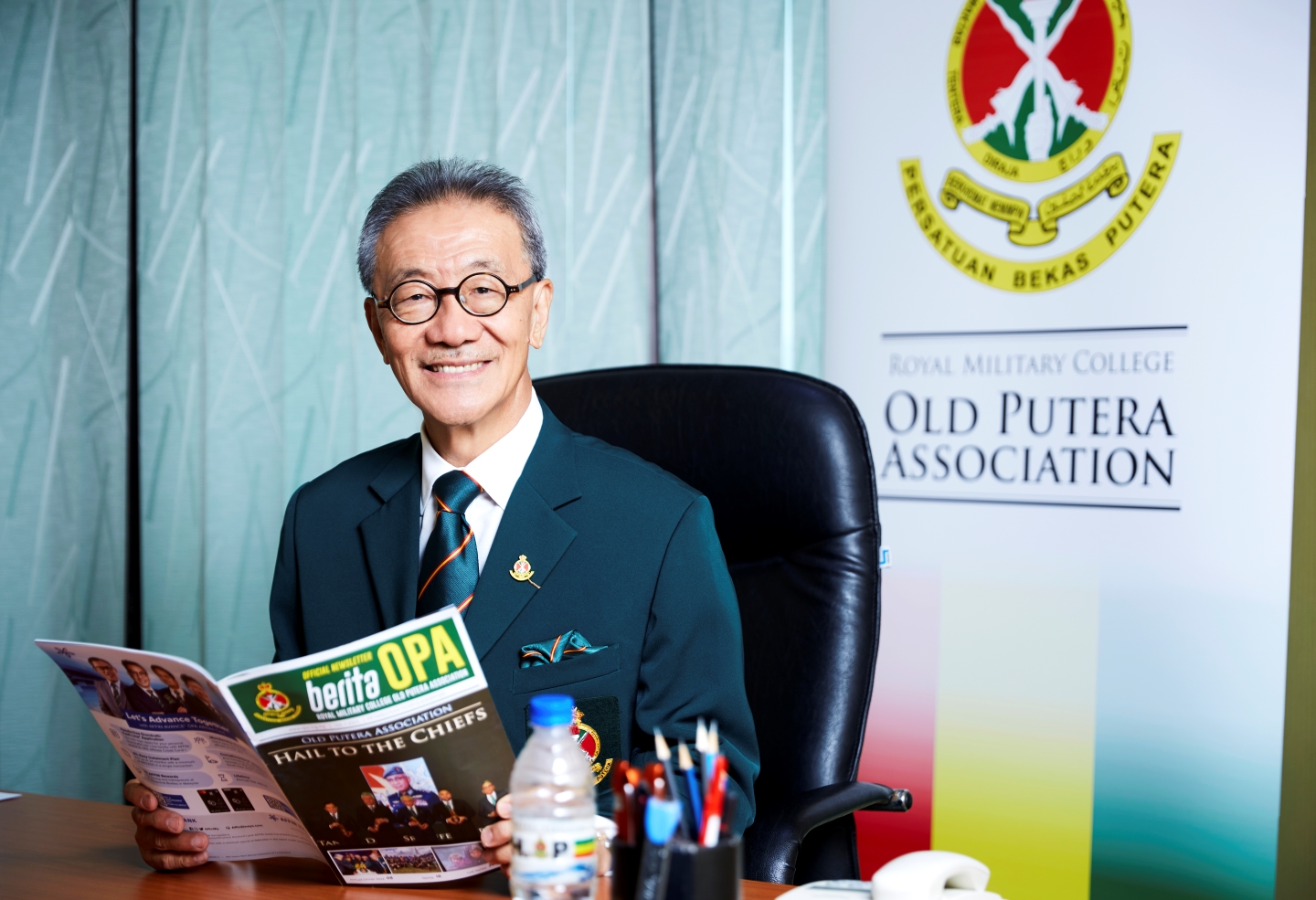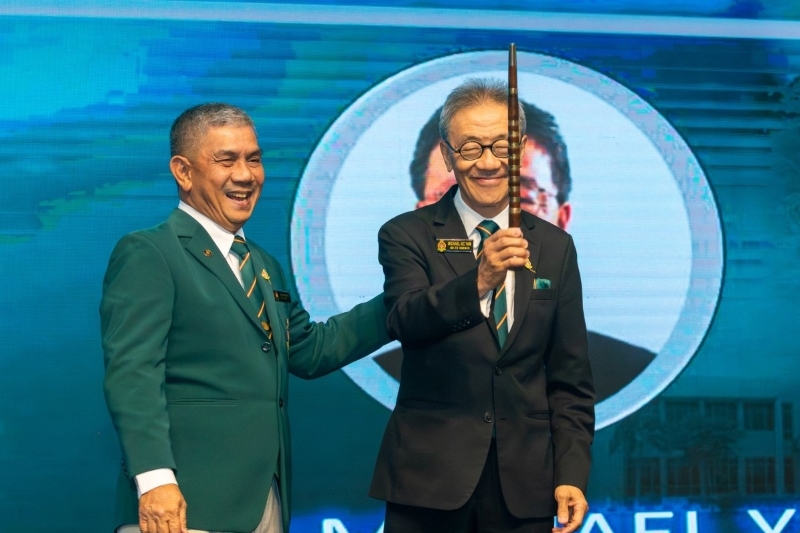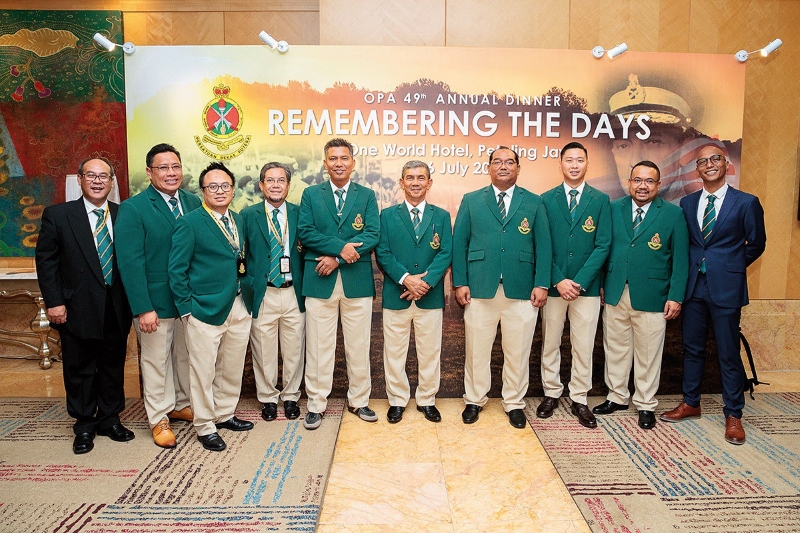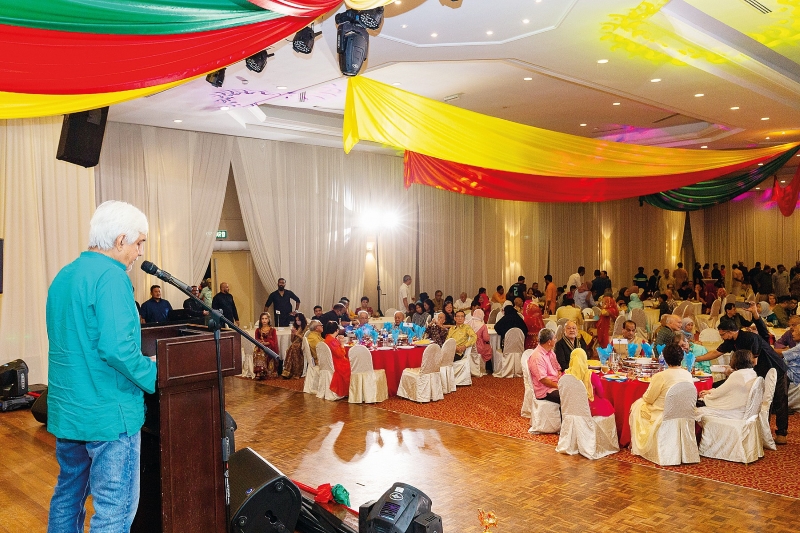
Yam boasts an impressive career spanning four decades in the construction, real estate and corporate sectors across Malaysia, the UK, South Africa and Australia (Photo: SooPhye)
It was 1968, a year of change and revolution in many parts of the world. In Kluang, Johor, a 15-year-old boy’s story began to unfold, driven by an aspiration sown by his science teacher, Ms Marion Teo. The captivating story she shared about her cousin, a student of the prestigious Royal Military College Malaysia (RMC), awakened a burning ambition in the young boy and would set him on a path of dedication, discipline and unwavering determination.
“I filled out the forms, not entirely certain about what I was applying for, except that admission to this prestigious institution was fiercely competitive. Often referred to as ‘The Sandhurst of Malaya’, it was a place where only the very best could hope to gain entry. Typically, only the top 10 or 20 students received application forms. If those ran out, so did your dream and you’d have to try again the following year,” Datuk Seri Michael Yam reminisces about those formative years when he meets with Options at the Old Putera Association (OPA) building in Saujana Golf and Country Club, Selangor. The Old Puteras are, for the uninformed, the alumni association of RMC.
This is a remarkable journey of a young cadet who walked the hallowed halls of this prestigious institution and went on to carve a path of excellence, leaving an indelible mark in the world of property and beyond. He holds the distinction of being the second non-Malay to assume the role of OPA president, following in the footsteps of Tun Dr Ling Liong Sik, who served from 1979 to 1981.
New recruit
It was an exciting time for Yam, then a student of Sekolah Menengah Tengku Aris Bendahara, when a travel warrant was issued to attend the final selection camp at Sungai Besi, Kuala Lumpur. It came in the form of a second-class train ticket, which brought him from Kluang to the KL railway station, and where he and other hopefuls from all over the peninsula were bundled into Malaysian Army 3-tonne Mercedes trucks that were waiting for them.
It was the start of a life-changing experience. How could one not feel fortunate? “I was informed that about 6,000 people from around the country probably applied and only 600 were invited to the week-long interview. We were put into the dormitory with 12 beds and a bunk area for under-officers and officers.”
There were a few phases to the interview. Aspiring candidates sat for two examination papers and took part in two sports as well as rigorous endurance tests, a full medical examination and a rather nerve-racking interview with the commandant, director of studies and a representative from the Ministry of Defence. As the days passed, the numbers dwindled, but the bonds of friendship forged during this period remained unbroken.
opa_michael_yam.jpg

Yam still cherishes his ties with those who failed to make the cut, as they shared the journey both to the selection camp and through their time at the college.
“I was the only one out of four from my town who got through the interview.”
The selection criteria extended far beyond academic prowess or athletic ability; they sought well-rounded individuals, placing significant emphasis on character. This institution welcomed students from all walks of life, transcending socioeconomic boundaries and racial distinctions. It was a place where both the affluent and the underprivileged were treated with equality. Its uniqueness was so profound that it served as a model for the setting up of the National Junior College in Singapore.
Becoming putera
“I vividly recall the inaugural day of school in January 1969, an event that left a lasting impression on me. The director of studies, Tan Cheng Or — an Ipoh native and the first Malaysian to hold this position, following a succession of British educators — addressed all incoming students with a clear-cut message: ‘If you’re seeking academic excellence, you may want to consider returning to the schools you came from. This institution is primarily dedicated to leadership training.’”
At RMC, the new batch of students were organised into eight distinct companies, designated from A to H and each typically comprised 11 to 12 young cadets. Yam had the privilege of joining Company D, which stood for Delta as per military alphabet. It is in these units that one truly understood the concept of loyalty. “The bond formed with your company was, in many ways, stronger than your affiliation with the college itself,” he admits.
Leaving behind the familiarity of Kluang, Yam found himself in an environment in which his meals, uniforms, books and accommodation were all provided. “On top of these essentials, we received a monthly allowance of RM30 and we managed our finances through cheque books. This was a pivotal part of our training — learning to budget and manage our expenses. With some money left over, we ventured out once or twice a month, aiming to impress the young ladies from BBGS (Bukit Bintang Girls School) and CBN (Convent Bukit Nanas).”
During school breaks, the students received allowances based on the number of days away. In fact, just recently, his 93-year-old mother fondly remembered receiving RM1.96 from Yam every day during his time off from RMC.
He also recalls the delightful culinary diversity within the student body. Indian students, in particular, could opt for special meals (sans beef) prepared exclusively for them, for which they paid an extra ringgit. It became a coveted perk and it was not uncommon to seek out Indian classmates, not only for friendship but also the culinary benefits they brought to their mess halls.
Growing pains
Their daily routine was demanding and rigorously structured. They began each morning promptly at 6am, starting with the task of making their beds, taking showers and dressing in a precise manner with polished shoes and all.
Breakfast commenced at 6.30am, followed by a meticulous room inspection carried out by senior students, often those in Lower Six. The standard was unwavering: Everything in the room had to be impeccably organised, from the tidiness of the bed to the arrangement of items in the wardrobe. Any deviation from this standard incurred punishments, such as performing 10 or 20 push-ups, occasionally with a clap added between each repetition. Another common disciplinary measure involved running around the block 20 times.
Classes commenced at 7.30am, with a maximum of 20 to 25 students occupying each classroom. “Our teaching staff was drawn from the cream of the crop, with educators hailing from various corners of the country. While the majority were civilians, during my tenure, we were fortunate to have military education officers.”
After school, the students had a well-structured routine that included a designated rest period, opportunities for sports and physical activities, roll call and private study sessions. “Lights out at 11pm was a strictly enforced rule in military life. This strict curfew served not only as a matter of discipline but also a precaution against potential enemy targeting from aerial bombardments; a room with lights on could inadvertently attract unwanted attention,” he stresses.
Saturdays were particularly demanding, marked by intensive military training and jungle warfare exercises. “While we were allowed limited outings, it was mandatory to return before the sounding of the Last Post, a bugle call that signified the conclusion of the day’s activities,” says Yam.
This unyielding regimen instilled discipline and orderliness in their daily lives, fostering a strong sense of responsibility and attention to detail.
According to Yam, some form of ragging or initiation does occur but its purpose is to level the playing field by erasing any pre-existing hierarchy or status among students, thereby fostering a sense of equality. You have to work as a team and help each other out. There is a blanket rule that applies to all.
“To ensure fairness and mitigate any excessive ragging, a buddy system is implemented. In my case, my assigned buddy was Phua Kai Hong, a senior under-officer who currently holds the position of an adjunct senior fellow at the Institute of Policy Studies in Singapore. His primary responsibility was to protect me and ensure that the initiation process did not exceed reasonable limits.”
It is well known that RMC often finds itself in competition with Malay College Kuala Kangsar (MCKK). “I always tell whoever mentions this that ‘you be the judge’. When it comes to applications, only MCKK boys seek to join RMC and not the reverse. They may wear two ties but one may question where their true loyalty lies,” Yam laughs.
the_associations_49th_annual_dinner_in_2019.jpg

Post-RMC
Yam earned his degree in building and management studies from the University of Westminster in the UK and later obtained his professional qualifications as a fellow of the Royal Institution of Chartered Surveyors and a fellow of the Chartered Institute of Building. Notably, he made history as the first Malaysian and the second Asian to be elected president in the 190-year history of the Chartered Institute of Building.
He briefly flirted with the idea of military life, but it turned out to be more of a coffee break in his life’s grand plan — a mere three months before he happily reclaimed his civilian status.
His remarkable career includes being awarded a Fellowship by the Construction Industry Development Board in 2015, and recognition as an honorary member of the Malaysian Institute of Estate Agents in 2017. In 2021, during the 200th anniversary celebration of Heriot-Watt University, he was granted the esteemed title of honorary doctorate. Earlier this year, he received the prestigious Lifetime Achievement Award from Balai Ikhtisas Malaysia for contributions to the engineering, construction and property industry.
In addition to his numerous accomplishments, Yam serves as an adjunct professor and guest lecturer at higher education institutions such as UTAR, where he contributes to the master’s degree programme in real estate.
Yam boasts an impressive career spanning four decades in the construction, real estate and corporate sectors across Malaysia, the UK, South Africa and Australia. He has held leadership positions in renowned public-listed property companies, earning awards for his contributions, before retiring in 2008. Throughout his career, he served in prominent roles in notable organisations, including Bahman Consulting Engineers, the UK’s NHS Works Department, Landmarks Bhd, Peremba Malaysia, Country Heights Holdings Bhd and Sunrise Bhd.
In June 2023, he concluded his role as the 119th president of the Chartered Institute of Building, overseeing a global membership of 48,000 professionals. He also stepped down as chairman of InvestKL Corp after leading the Government Investment Promotion Agency for 11 years. He is currently chairman of the Triterra Group of Companies and several other investment holding companies, including Mercure KL Glenmarie Hotel.
In addition, the father of two boys and two girls holds positions as the past president, patron and current national council member of the Real Estate and Housing Developers’ Association and serves as a trustee and board member of Rehda Institute and GreenRE Sdn Bhd respectively.
opa_deepavali_event_2022.jpg

Charting OPA’S future
“I must tell you that I was approached to become the alumni president some 14 years ago but couldn’t take it on due to work commitments. Now that I have stepped down from a few positions, I am able to lead and serve. The previous president has done a great job for six years and it’s a tall order, but I am ready,” says Yam, an OPA life member who was elected president uncontested on Sept 2.
He has outlined his plan based on the acronym RMC. “The ‘R’ stands for ‘racial inclusivity’, which embodies our commitment to religious tolerance and the royalty, as we are united in our dedication to serving the king and country, even at the cost of our lives.
“The ‘R’ also means relevancy, in binding all the old boys together for sentimental reasons but also for CSR (corporate social responsibility) programmes, festival celebrations, knowledge sharing and prayers such as tahlil for the departed. You would notice the racial integration; that’s very important to us.” OPA has shown great support for the current students of RMC, including attending events and sports activities at the school.
“I aspire for our OPA to embody the ideals set forth by our founding father, Field Marshal Sir Gerald Templer, where the paramount principle is that Malaysia comes first. This is where the ‘M’ in our mission takes centre stage.”
He aims to champion moderation and mentorship, much like the invaluable guidance and support he received from his super buddy. “We are fortunate to have an abundance of brilliant minds within our ranks, including distinguished individuals like economist Jomo Kwame Sundaram, as well as luminaries such as Tan Sri Halim Ali and Samsudin Osman, who are eager to mentor and guide the younger generation.”
And then there is the aspect of captaincy, which essentially represents leadership, whether in sports or government service, all while fostering camaraderie. “Within my batch, there’s a strong bond that unites us. However, my goal is to bridge the gap between the different batches spanning the 1980s, 1990s and 2000s. Lastly, ‘C’ also signifies the importance of being compassionate and maintaining a sense of gratitude at all times.”
That encapsulates the story of Yam, a 69-year-old from Batch 69, who wears his passion on his sleeve. With his wealth of experience and background, the old boys can anticipate an array of exciting developments ahead.
This article first appeared on Sept 25, 2023 in The Edge Malaysia.


